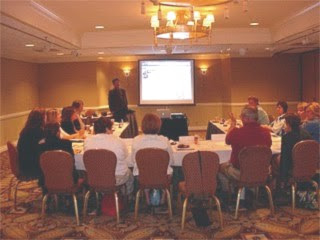- Your suggestions for a great location took us back to New Orleans, and boy...was this city ready for PICA to visit. What relevant, moving, inspiring stories New Orleans had to share with us! And how fortnate we all were to be able to listen to and absorb them.
- Your topic requests helped us find extraordinary speakers! Every single one gave us useful information that we can take back to our companies and put to good use.
- Your input, conversations and interactions with each other and our speakers remind us of why we're in this organization anyway - to share ideas, learn new information and fine-tune our skills. Each of your involvement - and your company's involvement - increase the value of our workshops and we appreciate it!
Friday, May 20, 2011
Thank You - BEST Workshop Ever!
Monday, March 28, 2011
May is Right Around the Corner
- an insurance commissioner address us
- a chance to interact with agents
- the opportunity to give back to the community in which we're meeting
- the chance to look at insurance through the eyes of an area that has needed our industry's help in a big way
If you've attended a workshop before, you already know how you feel when you leave - informed, rejuvenated, focused and ready to tackle the World of Insurance Communication. If you've been, you know just why you simply must find a way to attend again this year.
But if it's been a while, or if you've never attended, you're missing out on a great opportunity. I encourage you to sign up, or if you'd like more information, simply comment below and we'll get it for you.Wednesday, June 16, 2010
Workshop Summary - Michael Wilder Adjusts PICA's Social Media Mindset
Michael Wilder opened his super-informative session by assuring us that he wasn't there to convince us one way or another about whether we should include social media as a part of a communication strategy for our companies. However, by the end of his session, I think most of us felt that in order to move our organizations forward, we needed to think long and hard about using social media effectively.

Michael describes how social media can be used to generate energy about a group or product.
Since many people look at Facebook and Twitter as places to play on the Internet, why should we consider using them as tools to promote something as serious as insurance? Michael made two great points - first, that the idea of marketing has always been to cast our nets as far and wide as we can to catch the most possible fish. Second...social media is FREE! The only investment we are required to make when using it is our time.
So, how could social media help a business? Well, it's as simple as the concept of word of mouth: user reviews of a product can influence the purchases of their friends. Social media sites give companies an opportunity to establish an approachable identity online. Users can view the preferences of people they trust or admire and then rely on friend recommendations instead of only having the "company spiel" as a source of information.
What is attractive about social media? It's immediate, selective and easy to use. It allows people - even amidst the hustle and bustle and noise - to connect with authenticity.
Michael used Zappos as a case study to show us how one company has used social media to promote its products, connect upper management to the public, and create an online identity that is personal, approachable and likeable.
One concern I had as an insurance communicator was, "Do we have an obligation to respond if someone posts a comment to our corporately sponsored social media site?" Michael says that the obligation to respond isn't there, but a marketing opportunity exists when we do. Trends in posts can reveal where we need to improve. "You're saying, 'We're going to be dedicated to improving our service'...that is the only obligation you're creating with your online presence," Michael explained.
An additional thought Michael shared is that some businesses hesitate to have an online presence because they don't want to create a place where negative comments can collect and dwell. "Just because you don't have an account doesn't mean people aren't communicating. Negativity can be revealed anyway," he explained. But when we have a specific place online for communication to happen, we do have more control because we can see the comments and do something about them, whereas without a presence, we may or may not see the comments...and we'll miss the opportunity to improve service.
You can review portions of Michael's presentation to PICA and see the video he shared with us illustrating the prevalence of social media here.
Tuesday, June 15, 2010
Workshop Summary - Harlan Amborn Shows PICA the Future of Insurance
PICA Keynote Presentation Melds Industry Past and Present to Face the Future
Using lessons of the past to deal with the future was the theme of PICA Workshop Keynoter Harland Amborn’s presentation, “Changes in Insurance -- Past, Present and Future.” He entertained his audience with print ads and TV commercials from the past to illustrate changes to insurance industry exposures through evolving products, services and human issues. Amborn is deputy commissioner of the Nevada Division of Insurance, Las Vegas.

“In a relatively short time – just a few decades -- our world has changed so radically. For instance, consider the changes we’ve experienced in products we use, dangers we face, skyrocketing monetary values of the things we insure, a reeling (and hopefully recovering) economy, and global exposure,” he explained. “These are just a few of the issues we deal with. As insurance people and communications practitioners, understanding the evolution of our world is essential to facing future challenges.”
 Examples of future technology that may provide exposure to the insurance industry include:
Examples of future technology that may provide exposure to the insurance industry include:• Commercial space travel – the first suborbital commercial transportation is predicted to blast off from Orlando, Fla. by 2015.
• Cloning – “Select-A-Child” science opens the possibility of choosing a child who is not compatible with the rest of the family or its siblings.
• Robots – damages may be incurred when a robot is programmed incorrectly for its intended purpose.
o Computerized insurance surveillance (“black box” technology) – Automobiles – measuring everything from mileage and speed to driver habits and/or errors;
o Homes – ability to determine technologically if a dwelling is secured or unsecured, vacant or occupied, regardless of what the policy owner reports.
• Life insurance – embedding “tracking chips” into individuals to know where they are, what they are doing, and when.
• Health insurance – using tracking chip technology to monitor use of medication, lifestyle, and behavior that may endanger health and generate claims.
• “Thinking Caps” – mandated by employers, for instance, so that others can monitor an individual’s thoughts.
“These examples may seem completely absurd, but the technology is already being tested,” Amborn said. “At one time, landing on the moon was absurd, too. The future is happening as we speak, and the insurance industry must be ready to deal with it. As communicators, you need to be aware of the possibilities so you’ll be ready to communicate them for your management and your industry.”
Wednesday, May 26, 2010
Thank You!

Whether you contributed by attending the conference, sharing your ideas, providing feedback or presenting information, THANK YOU.
Your efforts increased our abilities and our skills...this renewed enthusiasm will help us to communicate our ideas more professionally and effectively.
We also thank members who were unable to attend this year. Your continued support - along with the support of your company - keeps PICA going. We hope you're able to attend in 2011!
Stay tuned for updates over the next week. We'll give you a recap of each presentation so you can share this information with your colleagues!
Thursday, February 4, 2010
Exciting Times for PICA, Inc.
What are some of your favorite insurance publications, either online or print? Go ahead and list them in the comments section and we'll consider them as we look at the best ways to promote PICA...
Thanks!
